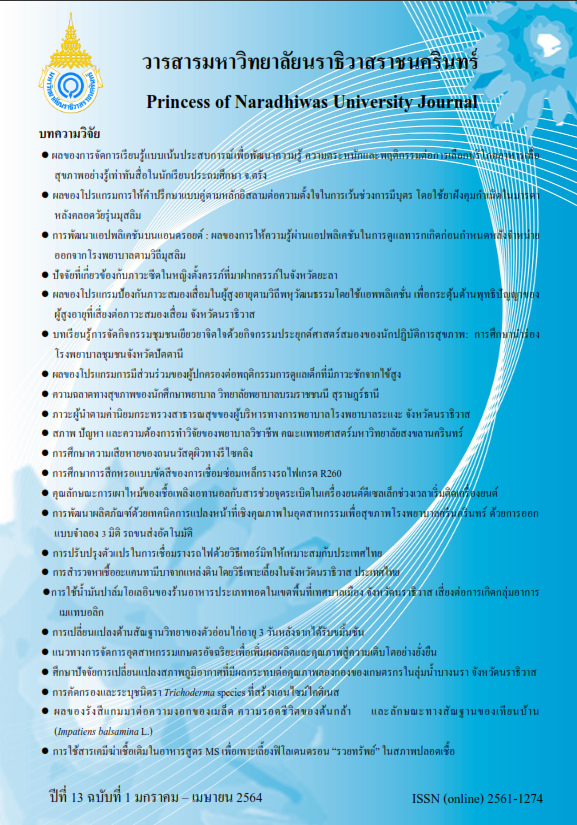Leadership of Nursing Administrator based on MOPH Core Value in Rangae Hospital, Narathiwat Province
Keywords:
leadership, MOPH core valu, nursing administratorsAbstract
This descriptive research aimed to study the leadership of the nursing administrator based on MOPH core value in Rangae Hospital, Narathiwat Province. Purposive sampling was used. The sample was divided into two groups, including 10 nursing administrators of Rangae Hospital and 95 nurses of Rangae Hospital. The research instruments were the demographic questionnaire, the Leadership of nursing administrators in the MOPH core value questionnaire, which was developed by a researcher, then verified by 3 experts. Content validity Indices (CVI) was 0.85, and Cronbach’s coefficients’ reliability was 0.96. Data were analyzed using descriptive statistics and Mann-Whitney U test.
The result of this study revealed that: 1) The mean score of the nursing administrator’ leadership based on MOPH core value were at high level in both groups of nursing administrators and nurses ( = 3.96, S.D. = 0.39, & = 4.15, S.D. = 0.41, respectively), 2) comparison of leadership means scores between the opinions of the nursing administrators and the resident nurse's group was no statistically significant difference. When considering each side, it was found that the mean of the study group, regarding patient care, significantly difference (P<0.05). The research findings revealed that nurses should implement the guidelines of the MOPH core values in developing nurse leadership skills. Self-development is a key factor in professional development to earn social acceptance. Also, the continual development in administration will increase efficiency within the Thai healthcare system.
References
Anantiya, P., Penchan, M., & Benjawan, B. (2016). The Effect of Transformational Leadership Development Program for Head Nurses on Professional Nurses Performance at a Specialty Hospital in the Department of Medical Services under the Ministry of Public Health. Journal of Nursing, Siam University, 17(33), 89 - 101.
Bureau of Policy and Strategy Ministry of Public Health. (2017). Healthy People, Happy People, Sustainable Health System, Positioning Vision, Mission Intention, and Strategy. Bangkok: (in Thai).
Daft, R.L. (1999). Leadership. The Dry den Press: Fort Worth Tx.
Frigon, N.L., & Jackson, H.K. (1996). The Leader: Developing the Skill and association. New York: The Free Press.
Kanoknus, T. (2010). Quality of Life of Registered Nurses in Bumrungrad International Hospital. A Thesis Submitted in Partial Fulfillment of the Requirements for the Degree of Master of Science Program in Mental Health. Chulalongkorn University. (in Thai).
McGregor, D. (1960). The Human Side of Enterprise. New York: McGraw-Hill.
Ministry of Public Health. (2017). MoPH Code of Conduct. Bangkok: (in Thai).
Narumon, W., Kwanchit, S., Nuntiya, D., Siritorn, B. (2014). Intercultural Communication Competence for Health Care Services in Migrant Workers. The 15th Graduate Research Conference. Khon Kaen: Khon Kaen University.
Nathanan, K., Wilawan, P., Areewan, K. (2011). Effects of Information Provision Using Video Media on Patients Knowledge and Practices in Prevention of Nosocomial Infection, Nursing Journal, 38(3), 98 - 109.
Nursing Division of Ministry of Public Health Thailand. (2018a). Role of Nurses. (1st ed). Publishing of Suetawan Co; LTD. (in Thai).
Nursing Division of Ministry of Public Health Thailand. (2018b). Strategy of Nursing Service in National Level (2017-2021) According to the National Strategic Plan Phase twenty-year (Public Health). (1st ed). Bangkok: (in Thai).
Office of the Civil Service Commission. (2009). Code of Ethics for the Civil Service. Retrieved Nov 9, 2020, fromhttps://www.ocsc.go.th/sites/default/files/document/pramwlcchriythrrm _ khaaraachkaarphleruuen-elmhnangsuue.pdf. (in Thai).
Orawan, K., Premruetai, N., & Sutteeporn, M. (2016). Relationships Among Constructive Organizational Cultures, Transformational Leadership, and Knowledge Management in Community Hospitals, Surat Thani Province. Journal of the Police Nurses, 8(2), 129 - 137.
Prasopchai, P. (2014). Sample Size Determination from Krejcie and Morgan (1970) Approach in Quantitative Research. Journal of Faculty of Applied Arts, 7(2), 114 - 118.
Rattana, T., & Phrakhrubhavanabodhikun. (2020). Ethics in Nursing Practice. Journal of Graduate MCU KhonKaen Campus, 7(1), 3 - 16.
Siriporn, T., Jaruayporn, J., & Wichaya, H. (2017). Nursing Leadership in the 21st century. Naresuan Phayao Journal, 10(1), 17 - 22.
Sirinthip, W. (2014). A Study of Nursing Administrator Leadership Among Multigeneration Professional Nurses, Private Hospital. A Thesis Submitted in Partial Fulfillment of the Requirements for the Degree of Master of Nursing Science. Chulalongkorn University. (in Thai).
Sripun, T. (2012). Food Consumption, Exercising, Stress coping and Health status of Professional nurses. Master of Science (Nutrition Education) Chiang Mai University. (in Thai)
Sumalee, Y. (2007). Conflict Management at Work: Experiences of Head Nurses. A Thesis Submitted in Partial Fulfillment of the Requirements for the Degree of Master of Nursing Science. Chulalongkorn University. (in Thai).
Supattra, W. (2014). Transformational Leadership: The Challenging of the Nurse Leaders. Journal of The Royal Thai Army Nurses, 15(3), 58 – 63.
Toemsak, S. (2009). Considerations for creating tools of type rating scale for research. Retrieved Nov 9, 2020, from http://www.ms.src.ku.ac.th.




